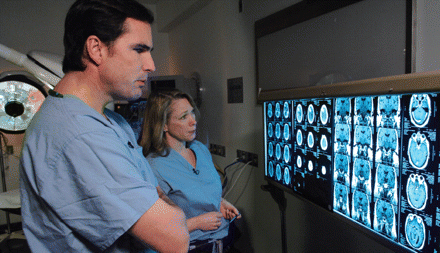Much work lies ahead for Rep. Gabrielle Giffords (D-Ariz.) as she recovers from a devastating head wound, said ABC News correspondent Bob Woodruff, who knows firsthand the path that Giffords now faces.
Like Giffords, Woodruff suffered a traumatic brain injury, and like Giffords, he survived by virtue of pure luck and rapid access to medical care. He is now back to reporting the news, but his return followed a long rehabilitation process similar to the one facing Giffords today, he told Psychiatric News in a phone interview just before he covered a news conference by Navy Cmdr. Mark Kelly, Giffords' astronaut husband.
It will be difficult to guess the speed of the congresswoman's recovery, said Woodruff, speaking from his own experience. "It's a long, long road, and it takes a lot of patience, especially for the family."
Woodruff was badly injured in 2006 by a roadside bomb blast while covering the war in Iraq. Rocks smashed through his jaw, just missing nerves and arteries. Part of his skull had to be replaced. He experienced what many U.S. service members have—surviving battlefield wounds thanks to improved body protection and quick access to advanced medical treatment.
Back then, treatment in the emergency room at Balad Hospital in Iraq was better than in the civilian world because the doctors there were treating so many blast injuries. Afterward, he guessed his was perhaps the fifth craniectomy performed there that week.
That extensive clinical experience treating traumatic brain injuries, while saving lives, also means that more troops need more rehabilitative care, for longer periods, than in previous conflicts.
"I'm almost completely recovered, but I'm still nervous about making some mistake on camera," said Woodruff. "I still have some significant aphasia. I know I've lost some vocabulary. I'll confuse two words with the same number of letters, so I have to concentrate harder about the words and their meaning. Coming up with a synonym for a word I'm searching for helps, but that trick doesn't work for names."
The emotional aftereffects of his injury linger as well.
"I have experienced some depression, but I'm not sure whether it's for biological and medical reasons or because of the sudden change in my life," he said. "Anybody who gets injured like that will feel psychological impacts."
Woodruff's experience also led to another new assignment: writing the foreword to the second edition of the Textbook on Traumatic Brain Injury by Jonathan Silver, M.D., Thomas McAllister, M.D., and Stuart Yudofsky, M.D., published by American Psychiatric Publishing Inc.
Still, much has changed in five years, he said.
"People know more about traumatic brain injury now," he said. "But there's still a big gap between what military hospitals and the VA can do and many local medical and rehab facilities."
To fill that gap, Woodruff established the Bob Woodruff Foundation to educate the public about the needs of troops returning from war. The foundation contributes to national and local programs that provide service members with medical care, counseling, and other individual services. It also addresses broader social issues such as homelessness and substance abuse among veterans.
Overall, the biggest effort from both the military and civilian worlds must focus on addressing the return to civilian life, he said. That transition is even harder when a veteran is dealing with depression, anxiety, posttraumatic stress disorder, or suicidality.
Veterans need help, but not pity, he emphasized. "Veterans feel they have accomplished a lot more than just fighting and dying," he said.
His own resiliency illustrates the recovery possibilities for others with a traumatic brain injury.
"Things that used to bother me don't anymore," he said. "I've grown closer to my family, especially my children. You have to live your life while you can, because you don't know when you're going to go."

